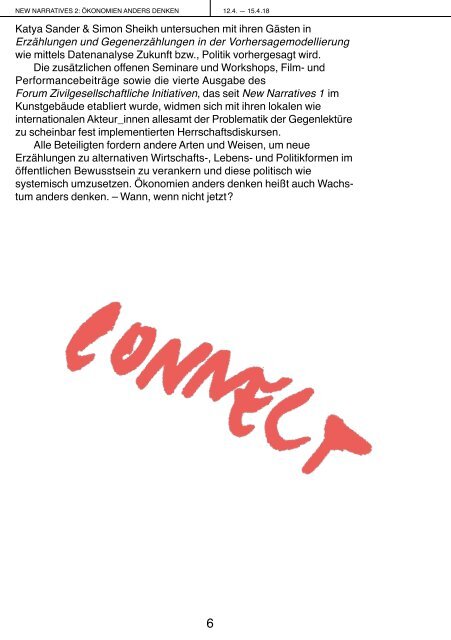NEW NARRATIVES 2: Thinking Economics Differently / Ökonomien anders denken (Stuttgart, 2018)
Program of the summit at Kunstgebaeude Stuttgart in April 2018, including all abstracts and short bios of the contributors (English and German) / Programm mit allen Abstracts und Kurzbios der Beteiligten des Gipfeltreffens im Kunstgebäude Stuttgart im April 2018 (Deutsch und Englisch)
Program of the summit at Kunstgebaeude Stuttgart in April 2018, including all abstracts and short bios of the contributors (English and German) / Programm mit allen Abstracts und Kurzbios der Beteiligten des Gipfeltreffens im Kunstgebäude Stuttgart im April 2018 (Deutsch und Englisch)
Create successful ePaper yourself
Turn your PDF publications into a flip-book with our unique Google optimized e-Paper software.
<strong>NEW</strong> <strong>NARRATIVES</strong> 2: ÖKONOMIEN ANDERS DENKEN<br />
6<br />
12.4. — 15.4.18<br />
Katya Sander & Simon Sheikh untersuchen mit ihren Gästen in<br />
Erzählungen und Gegenerzählungen in der Vorhersagemodellierung<br />
wie mittels Datenanalyse Zukunft bzw., Politik vorhergesagt wird.<br />
Die zusätzlichen offenen Seminare und Workshops, Film- und<br />
Performancebeiträge sowie die vierte Ausgabe des<br />
Forum Zivilgesellschaftliche Initiativen, das seit New Narratives 1 im<br />
Kunstgebäude etabliert wurde, widmen sich mit ihren lokalen wie<br />
internationalen Akteur_innen allesamt der Problematik der Gegenlektüre<br />
zu scheinbar fest implementierten Herrschaftsdiskursen.<br />
Alle Beteiligten fordern andere Arten und Weisen, um neue<br />
Erzählungen zu alternativen Wirtschafts-, Lebens- und Politikformen im<br />
öffentlichen Bewusstsein zu verankern und diese politisch wie<br />
systemisch umzusetzen. <strong>Ökonomien</strong> <strong>anders</strong> <strong>denken</strong> heißt auch Wachstum<br />
<strong>anders</strong> <strong>denken</strong>. – Wann, wenn nicht jetzt?<br />
<strong>NEW</strong> <strong>NARRATIVES</strong> 2: THINKING ECONOMICS DIFFERENTLY<br />
New Narratives 2: <strong>Thinking</strong> <strong>Economics</strong> <strong>Differently</strong> negotiates—in open<br />
seminars and workshops, lectures, discussions, performances, and<br />
films—sociopolitical fields of conflict. One such issue is the question of<br />
alternatives to a primarily economically shaped concept of growth,<br />
and how this might be realized through criteria of a social and cultural<br />
nature oriented to the common good.<br />
In her keynote speech Economic Growth and Social Inclusion,<br />
Gayatri Chakravorty Spivak questions, among other things, the<br />
equating of “development” and “state economic growth.” She identifies<br />
the accompanying opacity of a political and economic “culture” that,<br />
for example, enshrouds the effects of environmental destruction, war,<br />
and displacement and that is essentially responsible for inequality and<br />
social upheaval.<br />
So as to provide a focus of program content, we invited the<br />
political scientists Athena Athanasiou & Elena Tzelepis, the artist and<br />
curator Boris Ondreička, the artist Katya Sander together with the<br />
author and curator Simon Sheikh, to each conceptualize a one-day<br />
topic and to then discuss it with international guests as well as local<br />
civil initiatives.<br />
Pursuing the topic of What If We Don’t Make It? —The Economy of<br />
Doom, Boris Ondreička brainstorms, together with his guests, utopias<br />
and doomsday scenarios in order to speculate about ideas of family,<br />
community, and economics in relationship to laws and normative orders.<br />
In Performing “Crisis” as Critique: Acts and Arts of Remapping<br />
the Present beyond Economization, Athena Athanasiou & Elena Tzelepis<br />
view, with their guests, the limitations of the dominant expressions of<br />
the imaginary as engendered in Europe and globally through neoliberal<br />
forms of government, while at the same time forms of art/action as<br />
democratic participation emerge, opening up new possibilities for<br />
thinking and creating publicness. In Narratives and Counter-Narratives<br />
of Predictive Modeling, Katya Sander & Simon Sheikh explore, with their<br />
guests, how given data is analyzed to predict future behaviors—in<br />
short: politics.<br />
The additional open seminars and workshops, filmic and performative<br />
contributions, as well as the fourth edition of the Forum Civil Society<br />
Initiatives, which since New Narratives 1 has been established at the<br />
Kunstgebäude, along with all involved parties—including local<br />
and international participants—will address problems related to the<br />
counterreading of the seemingly firmly implemented discourses<br />
on governance.<br />
All involved individuals are demanding other ways of anchoring in<br />
public consciousness new narratives on alternative forms of economics,<br />
life, and politics, and ways of applying these narratives both politically<br />
and systemically. <strong>Thinking</strong> economics differently also means thinking<br />
growth differently.—If not now, then when?<br />
7<br />
INTRO


